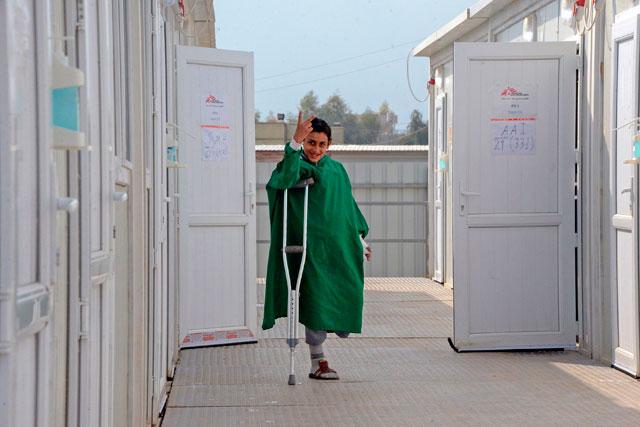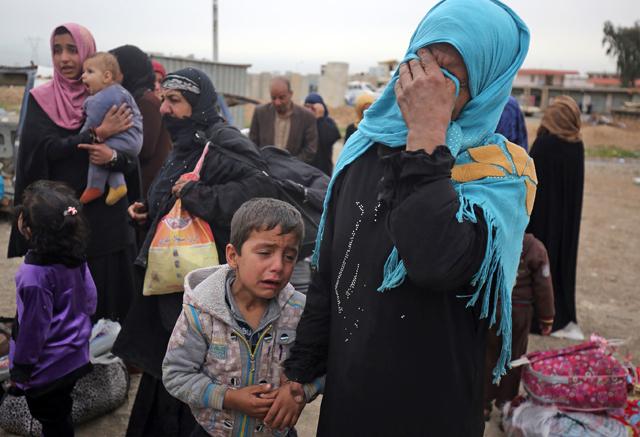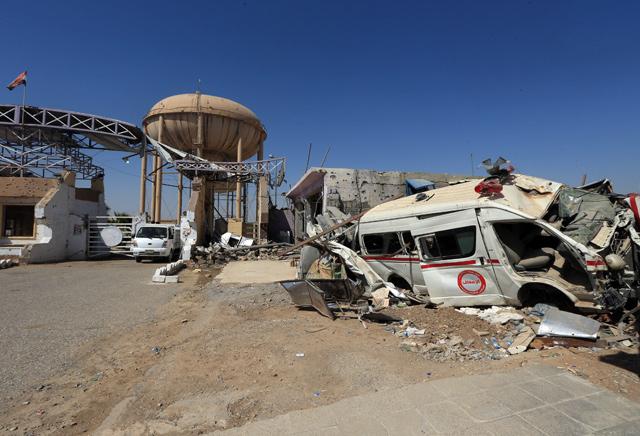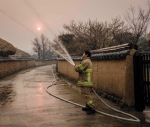You are here
After Daesh ouster, Iraqis flock to new hospital
By AFP - Dec 14,2016 - Last updated at Dec 14,2016
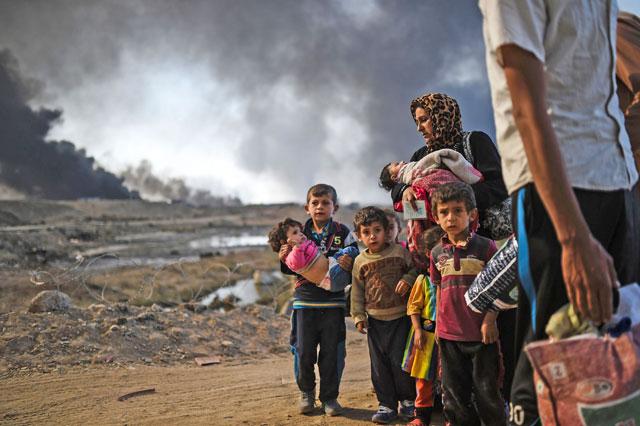
Iraqi families, who were displaced by the ongoing operation by Iraqi forces against militants of the Daesh terror group to retake the city of Mosul, are seen near Qayyarah, south of Mosul, on October 29 (AFP photo)
QAYYARAH — When it was ruled by extremists, residents of Qayyarah in northern Iraq had to travel for hours through checkpoints if they needed medical treatment.
But this week, Mahmoud drove his son Mohammed straight to a new emergency unit in town after a mine exploded in the young boy’s hand while he was playing.
Behind the front lines of an Iraqi offensive to retake the Daesh terror group bastion of Mosul, Iraqis are flocking to the facility after months without healthcare under the extremists.
“Just a week ago it would have been impossible” to treat Mohammed, says the 35-year-old construction labourer, sitting by his recovering son, whose nose tip was also burnt in the explosion.
Medical charity Doctors Without Borders (MSF) opened the hospital last week after Iraqi forces expelled Daesh from Qayyarah in August, providing Baghdad with a platform for its assault on Mosul further north.
Under Daesh, “medicine was difficult to find. The only way to get treatment was to travel to Erbil” in Iraqi Kurdistan some two hours away by car, Mahmud says.
MSF project coordinator Claire Nicolet says some chronically ill patients in Qayyarah for two years and a half did not see the inside of a hospital.
“There is no emergency hospital around here from Mosul to Tikrit” over a stretch of 250 kilometres, she says.
When MSF opened its hospital in the agricultural town last week, its some 100 staff members — including 80 Iraqis — were quickly overwhelmed with “medical and surgical emergencies”, she says.
“We’ve received around 250 patients already for the first week,” she says, wearing an MSF jacket, as families wait near a reception desk behind her.
In a nearby room with painted white walls, two nurses busy themselves cleaning and bandaging the arm of Salem Shahban, 16, after a motorbike accident.
‘Fractures, road accidents’
Amid beds covered in fresh white sheets, a Polish doctor tries to distract five-year-old Abdelrahman Taha with toy cars while he examines his arm.
Zahra Kadhim, an emergency doctor from Baghdad, says she and colleagues are ready to receive all manner of emergencies 24 hours a day.
“We get fractures, road accidents, burns. We perform all forms of emergency surgery,” says Kadhim, wearing a long white coat and stethoscope draped around her neck.
Iraq long prided itself in providing free health care for all, but after the fall of president Saddam Hussein international organisations expressed alarm over the degraded state of the country’s hospitals.
International sanctions against Iraq in the 1990s weakened infrastructure in the health sector, while ensuing violence destroyed hospitals and caused many doctors to flee.
Those who remain today “are seriously considering leaving, like many other professionals who are often trained abroad”, a medical official in northern Iraq has told AFP, asking to remain anonymous.
The World Health Organisation said last year Iraq only had six physicians per 100,000 inhabitants.
Daesh declared a self-styled caliphate across parts of Iraq and neighbouring Syria in 2014, implementing its radical interpretation of Islamic law in areas it controlled.
“The health sector in areas under Daesh control has been greatly affected. Daesh had a negative affect on all aspects of daily life,” says Kadhim.
But today, beyond the security checks at the hospital’s gate, life in Qayyarah is slowly returning to normal.
The market has reopened and the butcher’s display is lined with pieces of freshly slaughtered mutton.
In the distance, however, dark black smoke billows up from oil wells set alight by fleeing extremists now fighting Iraqi forces in the streets of Mosul.
Related Articles
MOSUL, Iraq — Explosives left behind by the Daesh group in Iraq's Mosul took 12-year-old Abdallah's left leg, but another kind of terror may
QAYYARAH, Iraq — The babies cry with hunger but are so severely malnourished that doctors treating them at a hospital in Iraq would make the
MOSUL — A year after Iraqi forces recaptured Mosul from Daesh, the city's healthcare system remains broken, its hospitals lie in ruins and e


